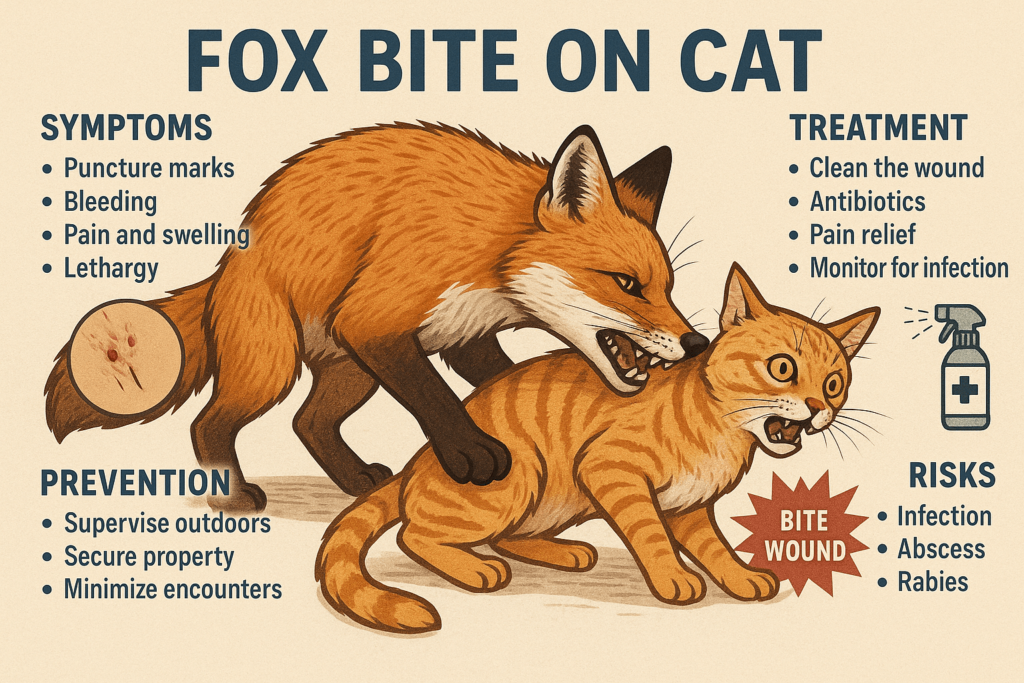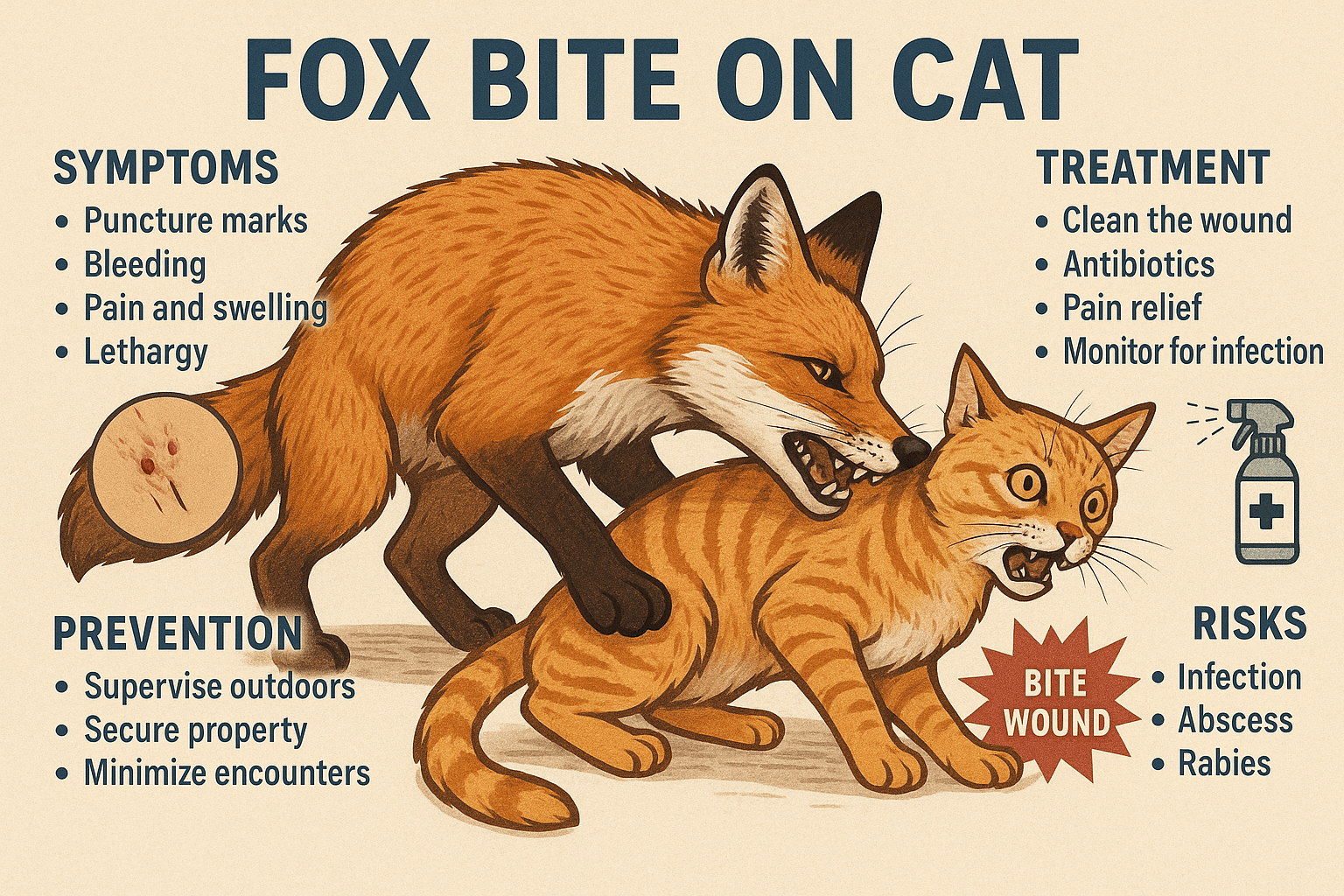What to Do If Your Cat Gets a Fox Bite
Encounters between cats and foxes can happen, especially if your feline friend spends time outdoors. While foxes are generally cautious creatures, they may bite if they feel threatened or during territorial disputes. A fox bite on a cat is not only painful but also poses potential health risks, including infections and the transmission of diseases. As a responsible pet owner, it’s crucial to know how to respond promptly and effectively if your cat suffers such an injury. In this blog post, we’ll explore everything you need to know about handling a fox bite, from immediate first aid to long-term care, ensuring your cat stays safe and healthy.
Immediate Steps to Take After a Fox Bite
If your cat has been bitten by a fox, acting quickly is essential to minimize complications. Here’s what you should do right away to address the injury.
Assess the Injury:
Gently examine the bite to determine its severity. Look for signs of puncture wounds, bleeding, or swelling. Avoid causing further pain to your cat during inspection.Stop the Bleeding:
Apply gentle pressure with a clean cloth or gauze to control any bleeding. Avoid wrapping the area too tightly, as this can restrict blood flow.Clean the Wound:
Rinse the bite area with lukewarm water to remove dirt or debris. Use a mild antiseptic solution recommended for pets to prevent infection.Keep Your Cat Calm:
Ensure your cat remains calm and still after the incident. Stress can exacerbate the situation, so provide a quiet and comfortable space for them to rest.Contact Your Veterinarian Immediately:
Even minor bites require professional evaluation. Call your vet as soon as possible to discuss next steps and schedule an appointment.
Taking these immediate actions can help stabilize your cat’s condition until they receive proper veterinary care.

Potential Risks of a Fox Bite on a Cat
A fox bite may seem like a minor injury, but it can lead to serious health issues if not treated promptly. Understanding these risks allows you to take the necessary precautions.
Bacterial Infections:
Foxes’ mouths contain harmful bacteria that can enter your cat’s bloodstream through the bite wound, leading to infections like cellulitis or abscesses.Rabies Transmission:
Although rare in many regions, foxes can carry rabies. A bite could potentially transmit this deadly virus to your cat, making vaccination status critical.Tetanus Risk:
Deep puncture wounds from fox bites create an ideal environment for tetanus bacteria to thrive, posing another concern for unvaccinated cats.Delayed Healing:
Bites near joints or tendons may heal slowly and increase the risk of complications, such as lameness or chronic pain.Behavioral Changes:
Pain and discomfort from the bite may cause your cat to exhibit unusual behaviors, such as aggression, lethargy, or loss of appetite.
Being aware of these potential outcomes underscores the importance of seeking prompt veterinary attention for your injured cat.
Check this guide 👉Cat Bite vs Dog Bite: Best 7 Expert Tips!
Check this guide 👉What Is the Best Antibiotic for Cat Bites? Best 7 Expert Tips!
Check this guide 👉Why Does My Cat Bite Me While Purring? Best 7 Behavior Tips!
Signs of a Serious Fox Bite | Steps to Prevent Future Incidents |
|---|---|
Excessive swelling around the wound | Supervise outdoor time closely |
Signs of fever or lethargy | Install secure fencing around your yard |
Pus or discharge from the bite site | Keep food sources indoors to avoid luring foxes |
Difficulty moving or limping | Use motion-activated lights or alarms |
Visible redness spreading outward | Spay/neuter your cat to reduce roaming tendencies |
How to Prevent Encounters Between Cats and Foxes
Prevention is always better than cure when it comes to protecting your cat from wildlife threats. These tips will help minimize the chances of a fox encounter.
Limit Outdoor Access at Night:
Foxes are nocturnal hunters, so keeping your cat indoors during nighttime reduces the likelihood of an encounter.Secure Your Garden or Yard:
Install sturdy fencing with buried barriers to prevent foxes from entering your property.Remove Food Sources:
Avoid leaving pet food outside, as it can attract foxes and other predators to your yard.Use Deterrent Devices:
Motion-activated sprinklers or ultrasonic repellents can scare foxes away without harming them.Train Your Cat to Stay Close:
Teaching your cat to stay within sight while outdoors helps you monitor their safety more effectively.
By implementing these strategies, you can create a safer environment for your cat and reduce the risk of dangerous interactions with foxes.
Signs Your Cat Needs Emergency Care After a Fox Bite
Some symptoms indicate that your cat requires urgent medical attention following a fox bite. Recognizing these signs ensures timely intervention.
Difficulty Breathing:
Labored breathing could signal a severe allergic reaction or internal damage caused by the bite.Uncontrollable Bleeding:
If the bleeding doesn’t stop despite applying pressure, it may indicate a deeper injury requiring immediate treatment.Extreme Lethargy or Weakness:
Sudden weakness or inability to stand suggests systemic issues, such as infection or toxin exposure.Loss of Appetite or Vomiting:
Refusal to eat or frequent vomiting may point to complications arising from the bite wound.Aggressive Behavior or Hiding:
Cats in significant pain often hide or become unusually aggressive, signaling distress that needs addressing.
Promptly identifying these signs and seeking emergency care can make all the difference in your cat’s recovery process.
First Aid Kit Essentials for Pet Owners
Having a well-stocked first aid kit is invaluable when dealing with emergencies like a fox bite. Here’s what every cat owner should include in their kit.
Antiseptic Wipes or Solution:
These are essential for cleaning wounds and preventing infections before professional treatment.Sterile Gauze and Bandages:
Use these items to apply pressure and cover the bite wound temporarily.Disposable Gloves:
Protect yourself and your cat from contamination by wearing gloves during first aid procedures.Blunt-Tip Scissors:
Ideal for cutting bandages or fur around the affected area without risking further injury.Digital Thermometer:
Monitor your cat’s temperature to detect signs of fever, which could indicate an infection.
Equipping yourself with these tools ensures you’re ready to handle unexpected situations confidently.
How to Identify Local Wildlife Risks
Understanding the wildlife in your area helps you anticipate potential threats to your cat. Here’s how to assess and manage local risks.
Research Common Predators:
Identify which animals, such as foxes, coyotes, or birds of prey, pose a threat to small pets in your region.Observe Animal Activity Patterns:
Pay attention to when and where wildlife is most active, adjusting your cat’s outdoor schedule accordingly.Talk to Neighbors:
Share information about recent sightings or incidents involving foxes or other predators in your neighborhood.Check Local Regulations:
Familiarize yourself with laws regarding trapping or deterring wildlife to ensure compliance.Consult Wildlife Experts:
Reach out to local animal control or conservation groups for advice on managing wildlife interactions safely.
Staying informed empowers you to take proactive steps in protecting your cat from harm.
Tips for Keeping Your Cat Safe Indoors
If outdoor risks are too high, keeping your cat indoors is the safest option. These tips will help make indoor living enjoyable and fulfilling for your feline friend.
Provide Enrichment Activities:
Toys, scratching posts, and interactive games keep your cat mentally stimulated and physically active.Create Vertical Spaces:
Install shelves, cat trees, or perches to give your cat opportunities to climb and explore.Offer Window Views:
Place comfy beds near windows so your cat can watch birds and other outdoor activities safely.Maintain a Routine:
Stick to regular feeding, play, and grooming schedules to provide structure and stability.Use Pheromone Diffusers:
Products like Feliway mimic calming scents, reducing stress and anxiety associated with confinement.
With thoughtful planning, indoor living can be just as enriching for your cat as exploring the outdoors.
Frequently Asked Questions About Fox Bites on Cats
Can my cat fight off a fox?
While some cats may attempt to defend themselves, foxes are wild animals with sharp teeth and claws, giving them the upper hand in most cases.
Do fox bites always require antibiotics?
Not always, but vets often prescribe antibiotics to prevent bacterial infections, which are common with animal bites.
Should I vaccinate my cat against rabies?
Yes, especially if you live in an area where rabies is prevalent. Regular vaccinations protect both your cat and your family.
How long does it take for a bite wound to heal?
Minor wounds typically heal within one to two weeks, while deeper injuries may take longer and require ongoing care.
What if I didn’t witness the attack?
If you suspect your cat was bitten based on behavior changes or injuries, consult your vet immediately for a thorough examination.
Protecting Your Cat from Wildlife Threats
A fox bite on a cat is a serious matter that demands quick action and careful follow-up care. By understanding the risks, recognizing warning signs, and taking preventive measures, you can safeguard your feline companion from harm. Remember, vigilance and preparedness go a long way in ensuring your cat’s well-being, whether they spend time indoors or venture into the great outdoors. With the right knowledge and precautions, you can give your beloved pet the best chance at a happy, healthy life free from wildlife-related dangers.
Do Cats Have Taste Buds? Best 7 Expert Tips! – Discover how cats experience flavors and why their taste is so unique.
Do Dogs Have Taste Buds? Best 7 Expert Tips! – Discover how dogs experience taste, their preferences, and what it means for their diet and health.
Can Cats Taste Sweet? Best 7 Expert Tips! – Discover why cats can’t taste sweetness, how it affects their diet, and tips to keep them healthy and happy.
Can Dogs Taste Sweet? Best 7 Expert Tips! – Discover how dogs perceive sweetness, which foods are safe, and tips to manage their sweet cravings responsibly.





